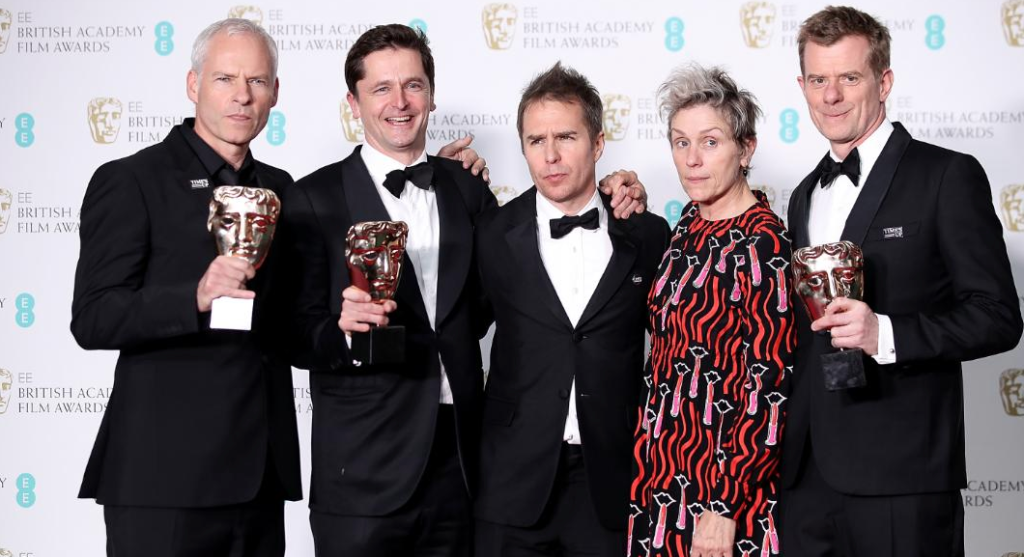The British Film Critics Have Spoken
19 Feb, 2018
Martin McDonagh’s “Three Billboards Outside Ebbing, Missouri” was the big winner at the 71st British Academy Film Awards, taking five awards including both best film and best British film. The film’s stars, Frances McDormand and Sam Rockwell, won best actress and best supporting actor, respectively, while McDonagh took home best original screenplay.
McDonagh lost out in the best director category to “The Shape of Water’s” Guillermo Del Toro. “The Shape of Water” took the second biggest haul of the night with three awards, while “Blade Runner 2049” and “Darkest Hour” took two apiece.
McDormand took to the stage in a red and black dress to accept the award for best actress. “As Martin said I have a little trouble with compliance but I want you to know I stand in alliance with my sisters in black,” said McDormand of her outfit, a contrast to most attendees who had worn black in support of the Time’s Up movement. “In drama school I was told I wasn’t naturally gifted and I should work at it. So I did,” joked the actress. It was McDormand’s first BAFTA award after four nominations.
Claiming best original screenplay for the film, McDonagh called Rockwell his muse. “Three Billboards” marked the pair’s third collaboration following a stage play and the film “Seven Psychopaths.” The win was McDonagh’s second BAFTA win in the original screenplay category; he previously won for 2008’s “In Bruges.”
Gary Oldman won best actor for his role as Winston Churchill in Joe Wright’s “Darkest Hour,” after presenter Salma Hayek joked the winner was Frances McDormand. It was Oldman’s first best actor BAFTA after three nominations — he was previously been nominated for Stephen Frears’ “Prick Up Your Ears” and Tomas Alfredson’s “Tinker Tailor Soldier Spy.” Oldman won BAFTAs for best British film and best screenplay for his directorial debut “Nil by Mouth.”
Oldman thanked Churchill, who he said had “held the line for integrity, honor and freedom for his country and the world.” “Darkest Hour” also won for its makeup and hair.
Accepting his director award, Guillermo Del Toro paid tribute to the legacy of Michael Powell and Emeric Pressburger, Charlie Chaplin, Stan Laurel and novelist Mary Shelley among his British influences. “She gave voice to the voiceless,” said the director of Shelley. It was the Mexican filmmaker’s second BAFTA, after having won best foreign language film for his 2006 Spanish-language film “Pan’s Labyrinth.”
“The Shape of Water” scored its first win of the night with Alexandre Desplat taking home the award for original music. It was Desplat’s third BAFTA award in eight nominations after winning for “The King’s Speech” and “The Grand Budapest Hotel.” The film also claimed the award for production design.
Allison Janney won supporting actress for her role in “I, Tonya.” The actress joked she had to clear up a lie she had been perpetrating for years: that she hadn’t actually graduated from the U.K.’s world renowned Royal Academy of Dramatic Arts, but that she had done a two-week course there.
With “Black Panther” dominating in cinemas around the world, one of its stars, British actor Daniel Kaluuya, had double cause to celebrate Sunday night as he was awarded the EE Rising Star BAFTA award, the only award voted for by the public. Having worked steadily in British film and television over the past decade, Kaluuya saw his breakout role in Jordan Peele’s “Get Out” bring him to global public attention as well as net him BAFTA and Oscar nominations as best actor. Kaluuya, who recently finished shooting Steve McQueen’s “Widows,” beat out Florence Pugh, Josh O’Connor, Tessa Thompson and Timothee Chalamet for the award.
“I am a product of arts funding in the U.K.,” said Kaluuya, thanking those who funded and supported arts funding in the country.
The ceremony, which was held at the Royal Albert Hall for the second consecutive year, was hosted for the first time by Joanna Lumley, best known for her role as Patsy in the “Absolutely Fabulous” TV show and movie.
Lumley took over as host from Stephen Fry, who has presented the BAFTAs 12 times since first emceeing in 2001, including each year since 2012. The new host immediately brought a fresh approach to the ceremony with a pre-recorded segment that featured the actress interacting with characters from nominated films including “Three Billboards,” “Call Me by Your Name,” “Darkest Hour” and “Paddington 2.”
Following a performance by Cirque du Soleil’s OVO inspired by “The Shape of Water,” which led the nominees going into the ceremony with 12, Lumley took to the stage of the Royal Albert Hall. She revealed that exactly 100 years ago the venue hosted an event celebrating the first women to get the vote in Britain. Turning her attention to the nominees in the room, Lumley joked that Oldman’s ability to disappear into a role was evident in his other roles of the year besides Winston Churchill such as Yoda, Wonder Woman and Lego Batman.
“In one sense you’re all winners tonight,” Lumley said, concluding her opening remarks. “And in another sense if you believe that you’ll believe anything.”
Pixar’s “Coco” claimed best animated film. It marked the seventh time Pixar has won the BAFTA award since its animated prize’s inception in 2006. Director Lee Unkrich previously won for Pixar’s 2010 film “Toy Story 3.” “Representation matters. Marginalized people deserve to feel like they belong,” said Unkrich, on the importance of having non-white characters on screen. “I hope we’ve made a difference and I hope it’s just the beginning.”
Raoul Peck’s “I Am Not Your Negro,” about U.S. novelist and social critic James Baldwin, claimed the BAFTA for best documentary. Peck said Baldwin was “the perfect image of a great humanist.”
Park Chan-wook’s Korean language film “The Handmaiden” claimed the BAFTA for film not in the English language.
James Ivory collected the best adapted screenplay BAFTA for “Call Me by Your Name.” It was the 89 year old’s third BAFTA but his first for screenplay. He previously won twice for producing best film winners “A Room with a View” and “Howards End.”
The team behind the special visual effects of “Blade Runner 2049” beat out heavyweight competition from “Dunkirk,” “The Shape of Water,” “Star Wars: The Last Jedi” and “War for the Planet of the Apes.”
“I Am Not a Witch” won outstanding debut by a British writer, director or producer. Writer-director Rungano Nyoni said: “I want to thank all the people who said yes to me, without your support we couldn’t have made this, and all those who said no, frankly, because you really spurred me on.”
Celia Imrie presented the previously announced special BAFTA award for Outstanding British Contribution to Cinema to the U.K.’s National Film and Television School (NFTS). Imrie cited just of a few of the NFTS’ graduates including Oscar-winning animator Nick Park and acclaimed cinematographer Roger Deakins. Accepting the award Jon Wardle, director of the school, said the NFTS’ job was to find “the new Roger Deakins, wherever they come, and make sure they have the support they need.”
Just moments later the NFTS scored its fifth consecutive win in the British short animation category, with stop-motion film “Poles Apart,” while Deakins went on to win the BAFTA for cinematography for Denis Villeneuve’s “Blade Runner 2049.” It marked Deakins’ fourth BAFTA win from nine nominations. His previous wins in the category came for the Coen brothers’ films “The Man Who Wasn’t There,” “No Country for Old Men” and “True Grit.”
As previously announced, Ridley Scott was honored with a BAFTA Fellowship, the body’s highest accolade, for his outstanding and exceptional contribution to the industry. The veteran British director and producer received a standing ovation as he took to the stage. “It’s been 40 years in this business and this is the first time they’ve given me anything,” said Scott. “I’m constantly reminded by journalists that I’m an octogenarian. I wonder if the real reason behind the award is ‘better give him something before it’s too late’.”
Scott paid tribute to “his partner” and brother Tony Scott, who died in 2012. The brothers shared the BAFTA award for Outstanding British Contribution to Cinema in 1995. “Entertainment can be the most powerful form of education,” said Scott, before finishing, “By the way i’m available in [fall] 2019.”
The Fellowship was presented to Scott by Kenneth Branagh and BAFTA president HRH the Duke of Cambridge. Scott has previously been nominated for five BAFTAs, twice for best film for “Thelma & Louise” and “American Gangster” and three times as best director for “Thelma & Louise,” “Gladiator” and, most recently, “The Martian,” but had never won.
Greta Gerwig’s “Lady Bird,” Paul King’s “Paddington 2” and Paul McGuigan’s “Film Stars Don’t Die in Liverpool” all went home empty-handed despite three nominations each.
Most attendees donned black and the Time’s Up pin badge in support of the Time’s Up movement. Actresses Gemma Arterton, Tessa Thompson, Gemma Chan and Naomie Harris were among those who brought activist companions to the ceremony. Arterton brought two of the women involved in the Ford sewing machinists strike of 1968, depicted in the 2010 British film “Made in Dagenham” and the stage production which Arterton starred in 2014. From the stage Arterton and Lily James, presenting the award for outstanding debut by a British writer, director or producer, thanked those assembled for supporting equality and change by dressing in black. Harris’ guest called on the film industry to tell the story of Ghanaian heroine Yaa Asantewaa, known as Africa’s Joan of Arc. The Duchess of Cambridge, in line with royal protocol which forbids members of the British royal family from taking a political stance on public issues, wore a dark green dress.
Variety
Mentioned In This Post:
About the author
Related Posts
-
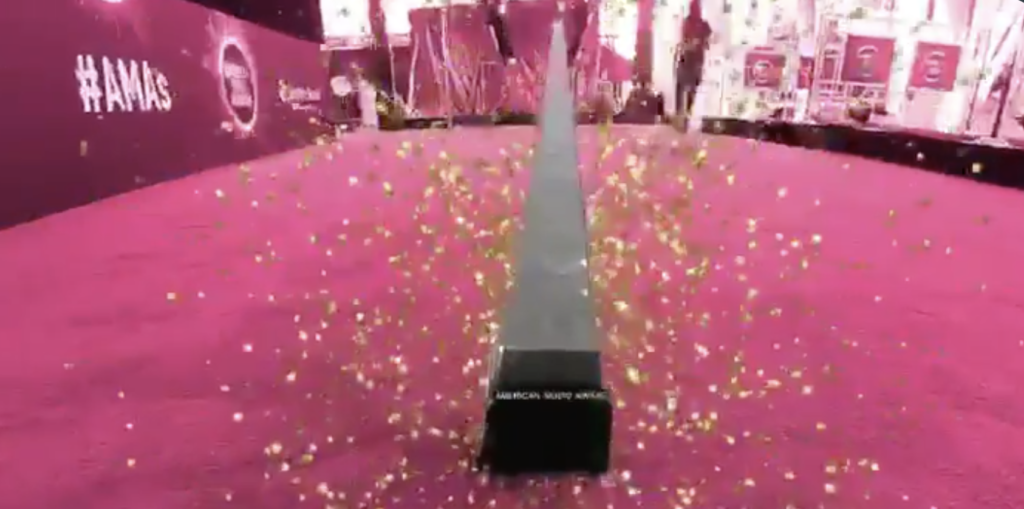
Records May Be Broken At This Years AMAs
-
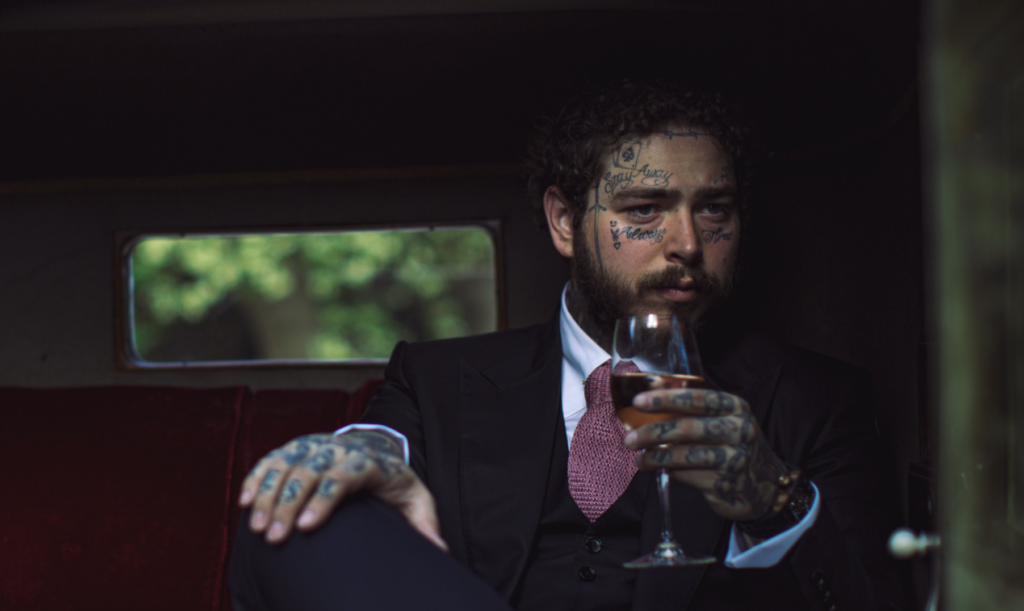
Post Leads The Way To The Billboard Awards
-
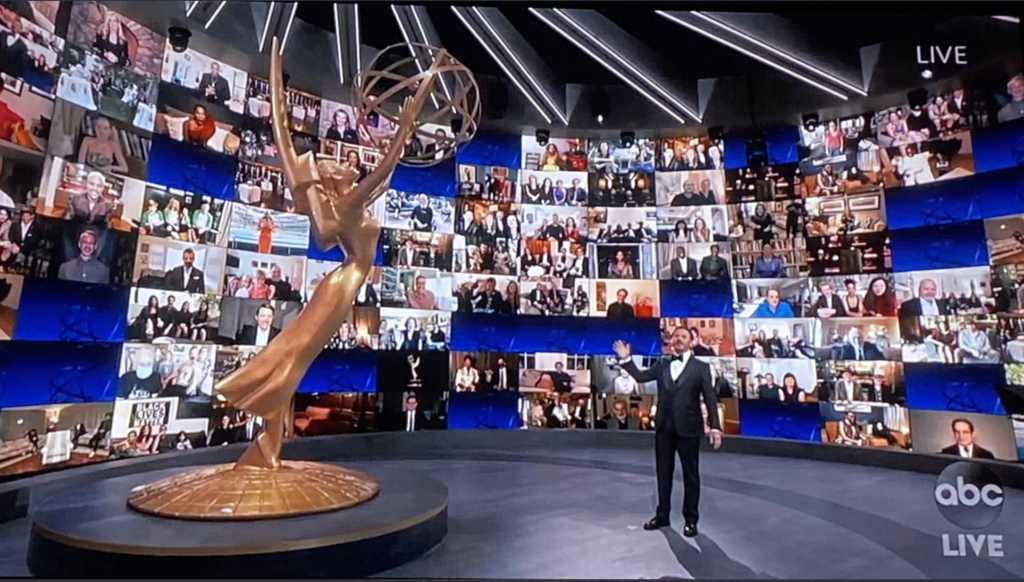
Pandemic or Not, The Show Must Go On
-
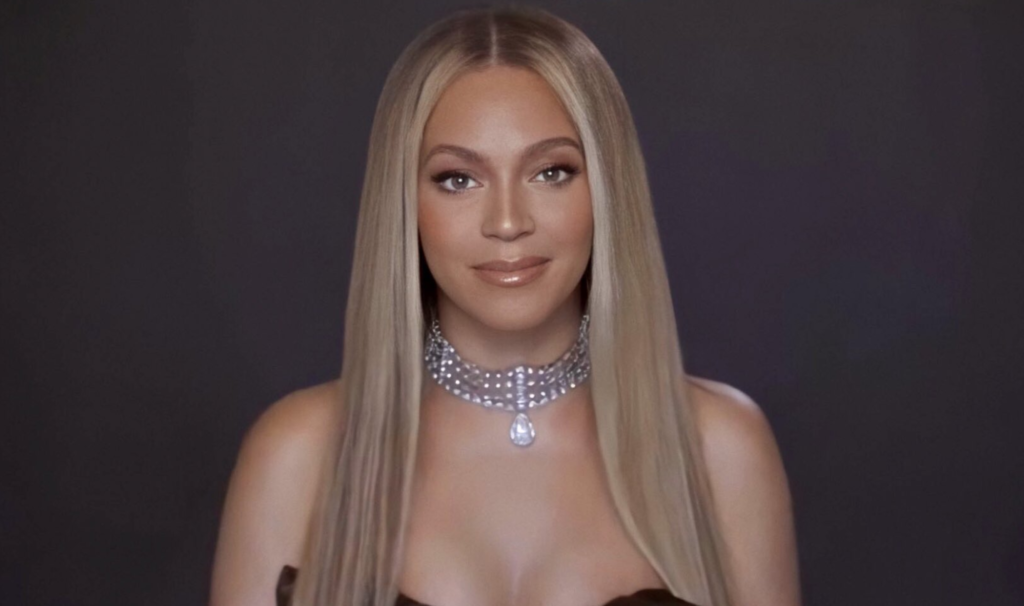
The Culture Can't Be Cancelled
-
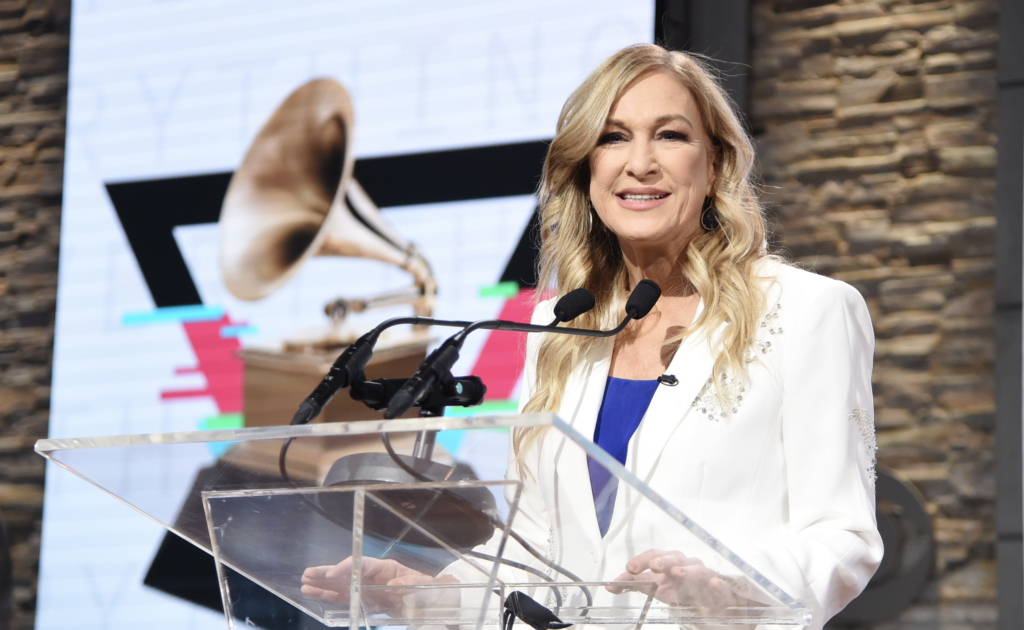
The Grammys Got Big Problems
-

A Holiday Special Unlike The Rest
-

The AMA's Are Gonna Be Lit
-

The BFF's Are Back To Host The Soul Train Awards
-

It's A Big Night For Country Music
-
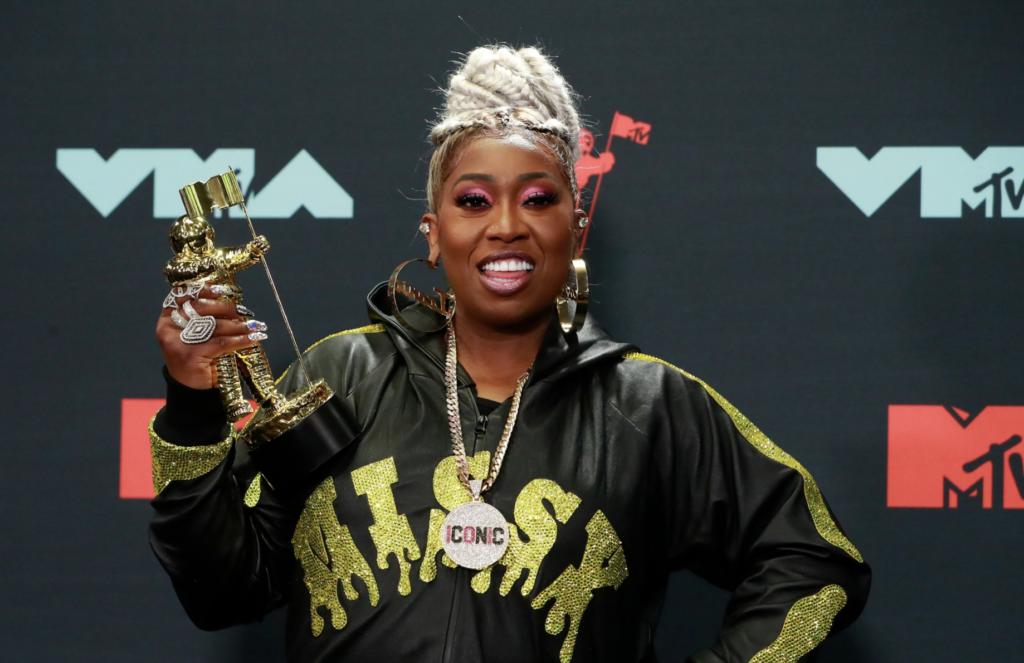
The Queens Owned The MTV VMA's

